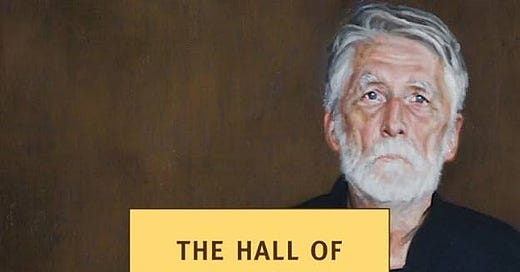Choosing a book to travel with is difficult. Do you want something light and relaxing? Something dense and engrossing? Something that is bound to put you to sleep?
Something very light would be dull but something very dense would misunderstand the situation entirely. I recall trying to read Norman Davies’ Europe on a plane, and it was a bit like listening to Beethoven in the gym. Wrong time, wrong place.
My choice for a trip to England was a book I’d read before — Simon Leys’ essay collection The Halls of Uselessness. Essay collections are good in general, because they are easily read in parts. But it is also a beautiful book.
Leys’ real name was Pierre Ryckmans. A Belgian author, he wrote under a pen name so he could criticise Chairman Mao and still be able to visit China. Blessed with a deep admiration for the country — which inspired a deep knowledge of its language and culture — Ryckmans was equally appalled by the savagery that gripped the communist state — the countless murders but also the institutionalised dishonesty and fanaticism that underpinned them.
For years, Ryckmans coolly and wittily dissected the evasions and equivocations of “the China experts”. His essay of the same name in The Halls of Uselessness is a masterpiece of rhetoric and analysis — casually deconstructing the excessively apologetic work of Ross Terrill without wasting energy on chest-beating moralism.
Yet Ryckmans was no one-note Cold Warrior. He opposed what was evil but he also defended what he thought was good. “An Empire of Ugliness” is a response to Christopher Hitchens’ mean-spirited book about Mother Theresa — The Missionary Position — and Ryckmans outdoes Hitchens when it comes to acidic wit. (“What follows is not much of a book review. But then, what is being reviewed is not much of a book.)
Uncharacteristically, Hitchens appears to have shyly avoided Ryckmans’ assertion that his title is obscene. The response is glorious:
If a schoolboy draws on the blackboard a cartoon of his teacher copulating with a goat, one may feel irritated by his immature prank, but at the same time, one must grudgingly acknowledge his spirited irreverence. If, however, this same schoolboy eventually insists tearfully that he did not do anything, that he did not mean to be cheeky, that he simply meant to draw an honest and plain zoology assignment, he simply cancels the only merit one could have credited him with.
Indeed. As a critic, Ryckmans preferred the apt metaphor and simile to adjectival bombast. Finding a passage in which Hitchens referred to Jesus breaking ointment over his feet, Ryckmans commented:
Imagine a new book, a critical essay on — let us say — some fundamental aspects of Western cultural history … Yet, on the first page, you come across this statement: the Trojan horse was a famous stratagem invented by Joan of Arc at the Siege of Orléans.
Frankly, I suspect that Ryckmans’ cracked one too many eggs into his critical pudding. I have little doubt that there were valid criticisms to be aimed at Mother Theresa. Humans being humans, sainthood strikes me as a concept which will always invite some form of qualification. But Ryckmans was offended by the cynical impulse towards completely despoiling a beautiful legacy. For him — illustrated with a neat anecdote about a café falling silent when Mozart began playing on the radio until a man pointedly turned it off — we have allowed our moral and aesthetic senses to be degraded to the point where beauty can actually offend us.
Ryckmans believed in speaking bluntly and plainly about that which could be analysed in such terms. But he was also aware that some things defied such analytical elegance. “The only purpose of my disjointed notes,” he wrote in an essay on Gide, “Is to warn [the reader] against the temptation to draw conclusions.” (Have no fear — he did draw blunt conclusions about Gide’s fanatical pederasty.)
Ryckmans could also acknowledge that even political systems which were largely directed towards evil could have interesting or impressive aspects. His essay about Zhou Enlai acknowledges the scale of his intelligence and dedication without at all obscuring the scale of the monstrousness he was involved in. Plainly evil actions can have complicated roots.
A lot of the essays here are about authors that Ryckmans admired: Balzac, Waugh, Chesterton, Orwell et cetera. Literature mattered to him in a deeply humanist sense. One sentence is applied to the perspective of Balzac that one feels may have applied to Ryckmans too: “life is a prison, and only imagination can open its windows.”
A challenging question, though, is why we feel the urge to reflect on one author like this. Different motivations present themselves. To commend their work to others. To frame it in the sense in which we think it should be framed. To enjoy the clarification of our thoughts.
Yet there is, sometimes, a more opportunistic impulse at work — an impulse towards attempting to define ourselves by them. Pierre Ryckmans spoke uncomfortable truths, I might be saying, AND SO DOES BEN SIXSMITH!
Well, I’d like to be remembered in such terms, of course. But I’m well aware that my culturedness, erudition and courage could not even play on the same team as his. Perhaps there is another embarrassing but less self-flattering impulse at play: the impulse towards attempting to internalise a quality by praising it. We do not ask that it reflects on us but by reflecting on it we may still catch a little of its light.





Thanks, it was marvelous to be reminded of this book and author, who is now mostly forgotten (his being Belgian doesn't help him). When Ryckmans published Chinese Shadows he was swimming against a strong tide of Maodalotry. But he could be interesting on many subjects.
The essay on Cervantes is worth the price of the book.